Exploring Sustainable Footwear Moroccan Manufacturing
In the tiny labyrinthine alleyways of Morocco’s swarming medinas, amid the vivid colors of spice stalls and the echoing call to prayer, a centuries-old tradition quietly thrives. A tradition with a solid past and a bright future – Moroccan Shoe Manufacturing. In the world of mass shoe production we live in today, the artistry and heritage of Moroccan shoemakers remain a true testament. A testament to the everlasting legacy of tradition.
But what makes Morocco one of the most prominent locations when it comes to shoe creation and manufacturing? In the following lines, we are going to explore this question in greater detail.
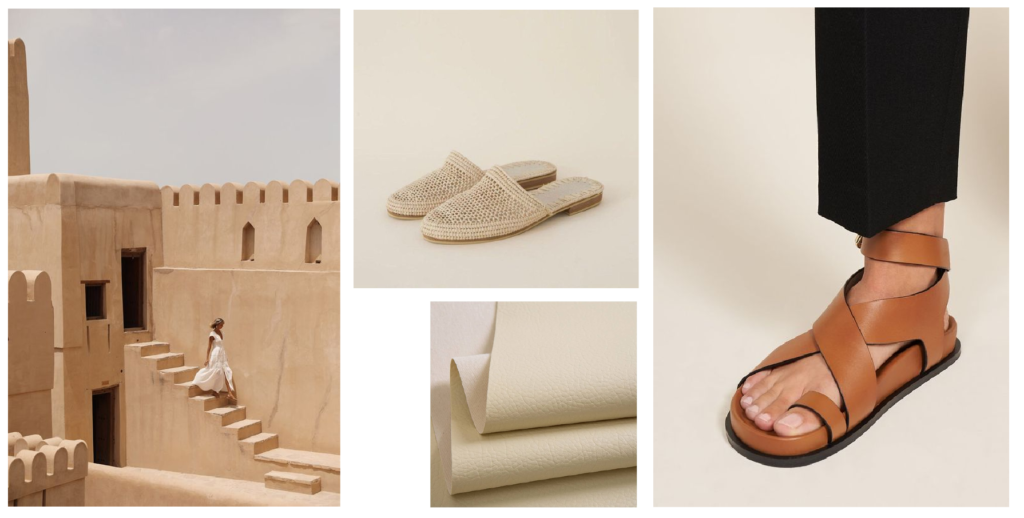
The Historical Roots of Footwear Manufacturing – Tracing Craftsmanship Through Time
The roots of modern-day Moroccan footwear manufacturing run deep into the rich history of the region. The art of shoe production in the North African country carries the echoes of Berber, Arab, and Moorish influences. Influences that have shaped Morocco and its skillful craftsmen over the centuries. As a result, today the intricate designs and techniques of shoe-making tell stories of cultural exchange and heritage that are passed down from father to child.
To be more specific, Moroccan shoe production can be traced all the way back to the Berber communities. These communities inhabited North Africa long before the Arab and Moorish influences settled in. It was these early Berber artisans who gave the beginning of the shoe-making legacy in the country.
As the years passed, various cultures and dynasties left their mark on the Moroccan country, as a result of which the art of shoe production evolved. For instance, the Arab and Moorish influences introduced calligraphy and intricate geometric designs to the craft. What was the outcome of all this you may ask?! Well, the shoes turned from just practical items into an expression of artistic excellence.
The Artisanal Process in Modern Footwear Manufacturing – Tradition and Technology Converge
Our mesmerizing tale about Moroccan footwear manufacturing will be incomplete should we not dive into the artisanal process behind it. Even though the shoe-making practices have been modernized, the love and passion of the local craftsmen remain unchanged. But that is not all – Moroccan shoemakers continue to rely on age-old techniques and tools, just as their ancestors did back in the day. The craftsmanship still involves skillful handwork, from cutting the leather to shaping and even stitching. A labor of love and a nod to the true dedication of the artisans.
This is why Moroccan shoes are much more than mere accessories. They are a trademark of dedicated craftsmanship and high virtuosity. A piece of art that carries with it the character and authenticity that can only come from the human touch.
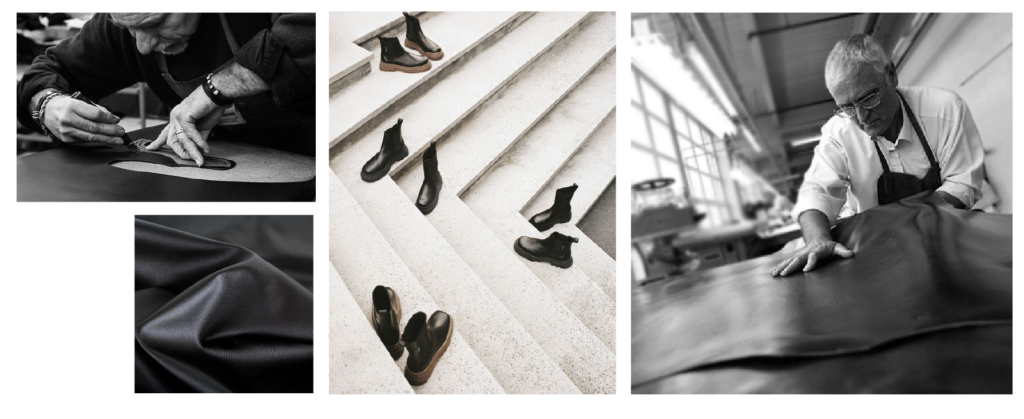
Design and Decoration – Artistry, Patterns, and Embellishments in Sustainable Footwear
One of the truly enchanting elements of Moroccan footwear manufacturing is its design and decoration. If you have come across a pair of shoes from the region, you could not have missed the fact that they are adorned with pleasant geometric patterns, exquisite embellishments, and intricate embroidery. But these unique designs are not arbitrary. They are a clear reflection of the country’s diverse regional and cultural influences.
For example, in Fez, shoes are typically adorned with intricate calligraphy, which is a true testament to the historic role of the town as a nest of Islamic scholarship. Similarly, in Marrakech, you’ll come across striking Berber shoes covered in vibrant, hand-stitched motifs reminding you of the Atlas Mountains. Whereas in Casa Blanca, the fusion of century-old tradition and modernity in shoe manufacturing reflects the town’s blend of historical richness and modern-day flair.
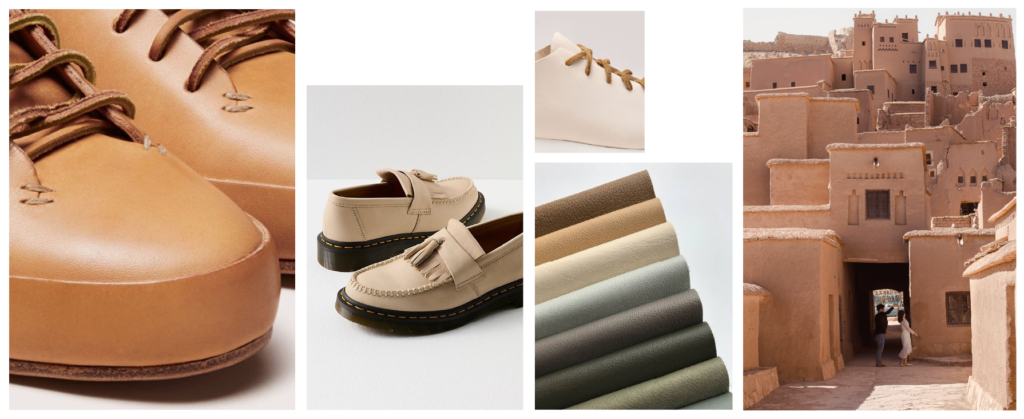
Eco-Friendly Practices in Footwear Manufacturing – Walking Lightly with Sustainable Materials
The love, passion, and dedication behind Moroccan shoe manufacturing come together with sustainability in mind. In the era of rising concerns about the future of our precious planet Earth, Moroccan shoe manufacturing serves as a beacon of eco-friendliness. Vegetable tanning practices, locally sourced materials, and the use of natural dyes are just a few examples in that regard.
The adoption of eco-friendly practices in Morocco does not only represent a nod to environmental consciousness but also a true commitment to the preservation of traditional shoe-making methods. It is an insurance that future generations will keep learning and practicing the art of Moroccan shoe craftsmanship, just as their predecessors did.
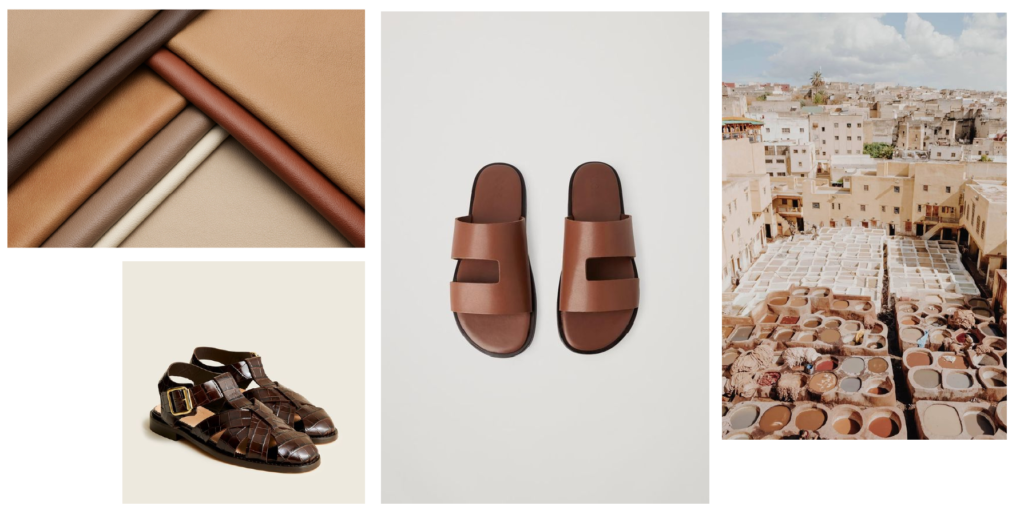
The Modern Revival of Sustainable Footwear – Bridging Tradition and Innovation
Even though Moroccan shoe-making has a deep connection to culture and tradition, it is not a static process. It is a process that is experiencing a contemporary revival. A revival is evident in the modern shoe designers of Morocco who are drawing inspiration directly from the country’s rich shoe heritage.
This is why today’s Moroccan-inspired footwear has a well-deserved place in high-end boutiques all over the world. The current designs mix successfully the old with the new by implementing traditional Moroccan elements into modern-day fashion – a true testament to its timelessness.
Nowadays, more and more artisans are finding innovative ways to adapt their inherited skills to the demanding modern markets while at the same time staying true to their heritage. In fact, this balance between tradition and modernity is what makes Moroccan shoe manufacturing so fascinating.
Ethically Sourced Shoes and the Global Market – Ethical Fashion’s Impact on the Shoe Industry
In the conscientious world we live in today, there’s an ever-growing demand for sustainable shoe materials and ethically sourced shoes. And for a reason. Ethical fashion shoes are all about the rights of workers, environmental preservation, and sustainable shoe manufacturers whose purpose is to revolutionize the shoe production landscape.
Brands in the global footwear industry nowadays proudly reveal their ethical practices, from ensuring fair salaries to implementing environmentally friendly and sustainable shoe materials. This significant shift not only raises the footwear manufacturing industry standards but also serves an informed consumer base that cherishes the story behind every pair.
As this movement earns traction, we become witnesses to a blend of age-old shoe craftsmanship with modern-day ethical values, making every step we take in those shoes a step towards a better and brighter future.
This is the exact reason Deepwear has become the guiding path for sustainable shoe manufacturers from all over the world. Manufacturers that manage to see through the lenses of our future, and have taken the decision to tap into the reservoir of artistry by offering ethically sourced shoes that share tales of heritage and craftsmanship.
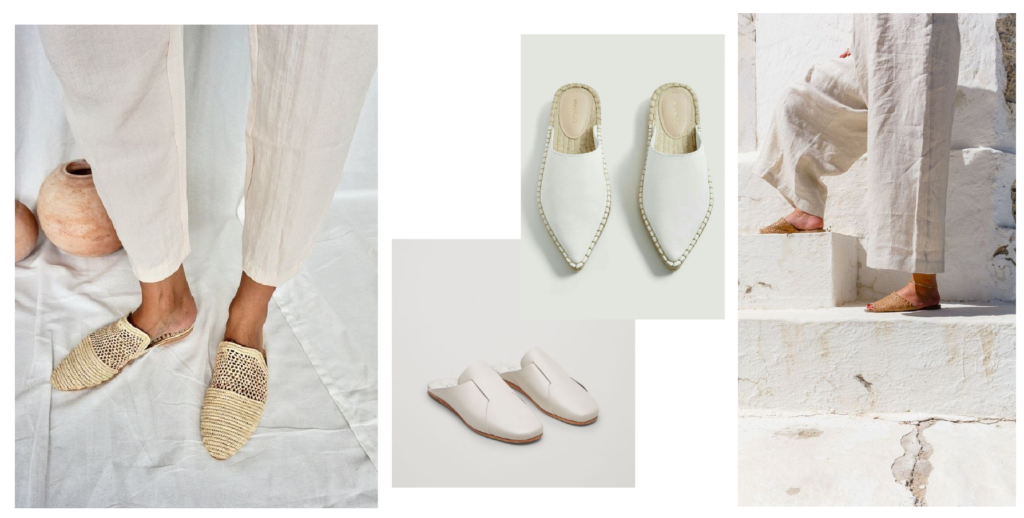
Conclusion – Stepping into a Sustainable Future: The Footwear Manufacturing Industry
As we can see from the lines above, Morocco is a clear example of an emerging market for shoe manufacturing. Accelerated by the free trade agreements in the country and the strong infrastructure network, the local shoe-making industry has become a real business opportunity. What is even more, Morocco is considered by many fashion companies as a real engine of shoe production and global export.
At Deepwear, we truly believe in that, which is why we have established solid relationships with the local shoe craftsmen. Our head office is situated right in the heart of Casa Blanca, which makes it strategically accessible for our clients to approach us and for us to connect them with factories, workshops, artisans, and suppliers who operate locally.
Get in touch today and allow our own exclusive sourcing team, stationed in Morocco, to help you with all of your shoe-sourcing needs. We know the local shoe market inside out and also know how to deal with the Moroccan factories in order to ensure proper communication. Let us cater our extensive database according to your own specifications.